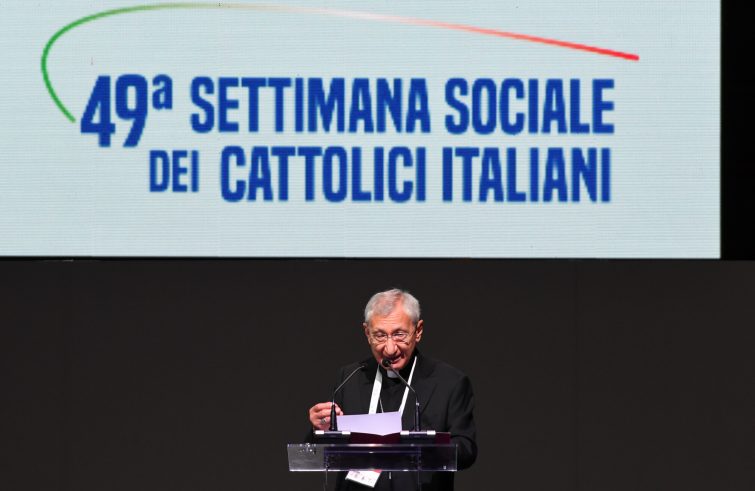
(from Taranto) “As we continue to improve our ability to join forces in the near future, we will truly become a people on the move, supporting our country in its efforts for an ecological, social and spiritual transition towards the common good”, said the Archbishop of Taranto, Monsignor Filippo Santoro, president of the Scientific and Organising Committee in his closing remarks at the 49th Social Week of Italian Catholics. He emphasised the “common thread” connecting the previous Week, which took place in Cagliari, to the present one, and outlined the future directions for dioceses and parishes. “Looking back at the path that led us first to Cagliari and then to Taranto, we are encouraged in our choice of synodality, as indicated by Pope Francis for the Synod.” “The Church needs to renew herself by listening to everyone,” he said. “From here on, our duty will be to commit ourselves to ensuring that the legitimate requests, proposals, and the manifesto of young people are embraced and put into practice. We are running out of time!” he urged: “We know that we can bring about the kind of world we have only dreamt of for too long, while decisions regarding economic and social policies have caused serious disparities among peoples and degraded our planet Earth.”
Four “conversion and generative paths” for parishes.
“The first is the creation of energy communities which represent a major bottom-up opportunity” for ecological transition, “and for the strengthening of community ties that become more solid by sharing practical steps for the common good”, said Msgr. Santoro. “In the context of a just and socially sustainable transition, energy communities also provide income creation opportunities to sustain the faithful, parishes, foster homes, and local communities, as a number of good practices already implemented or in the process of being implemented at local level testify to,” noted the bishop: “We would like every faith community in every Italian parish to embark on a project and become an energy community.” “We know that reaching net-zero emissions by 2050 requires approximately 7 gigawatts/year of energy from renewable sources,” he said. “If all 25,610 parishes in Italy set up at least one energy community generating a maximum of 200 kilowatts (or created multiple communities capable of reaching that level of energy production combined), we would be contributing 5.2 gigawatts of energy from renewable sources.” The second track of engagement is responsible finance. “Our dioceses and parishes,” he recommended, “must be ‘carbon free’ in their savings management practices, using their portfolio to reward those corporations that excel in combining economic value, dignity of work and environmental sustainability.” The third track concerns responsible consumption. This entails promoting products in school canteens and dioceses that are not the fruit of illegal recruitment. The fourth and final avenue is “the alliance proposed in the Youth Manifesto: an intergenerational alliance and one between the various goodwill groups in our country.” It is therefore necessary to promote the contents of the Taranto event in the communities they belong to, notably the 7 points of the Manifesto on the alliance proposed and signed by young people, namely: “To foster the creation of community cooperatives, consumer cooperatives, energy communities and solidarity purchasing groups (SPG); to study, understand and enhance the potential of local communities; to enhance inland areas also through pastoral care in rural communities; to encourage a bold revision of the formation of young people; not to be afraid to promote love and care for the common home in catechesis; to ensure that in dioceses and parishes there is a referent with relevant competence for social, labour and integral ecology pastoral care; to work towards enhancing the role of women in the Church and in politics by supporting measures that ensure family-centred care; to foster and participate in active citizenship groups concerned with territorial problems.”
“Not a conference, but a springboard of hope and for initiating new processes”
With these words Card. Gualtiero Bassetti, archbishop of Perugia-CIttà delle Pieve, President of the Italian Bishops’ Conference, defined the four-day event at PalaMazzola, attended by some one thousand delegates representing almost all of Italy’s dioceses. “Catholics’ contribution to tackling crises is vital,” the Cardinal said in his homily at the concluding Mass celebrated in Taranto’s Co-Cathedral: “We are rooted in the conviction that the words and values of the Gospel not only provide an answer to people’s search for meaning, but can also be a source of inspiration for the economy and for political action. Viable solutions to environmental and social issues require the help not only of Catholics, but of all people.” The next event – besides the Synod of Bishops for the Universal Church and the Synodal Journey of the Churches in Italy – is the forthcoming Meeting with bishops of the Mediterranean region in February 2022, recalling the theme of the first meeting in Bari in 2020: “The Mediterranean: frontier of peace.”










